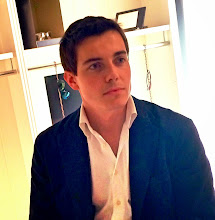Sono fermamente convinto che sempre di più attirare un consumatore significherà per qualsiasi brand lavorare affinchè gli aspetti emotivi del processo di acquisto superino quelli razionali.
Creare una "customer experience" significa a mio avviso lavorare su due aspetti.
A monte, sfruttando i social media per coinvolgere il target nei discorsi di marca e farlo sentire maggiormente protagonista del bene/servizio che acquista; a valle, sfruttando le nuove tecnologie per conquistarlo nel "momento dell'acquisto" attraverso operazioni di proximity marketing e comunicazione mutisensoriale.
Michele
"Experience" is the marketing buzzword of our time.
It seems like every week someone is extolling the vast untapped potential of experience to move your customers: Starcom recently created a Chief Experience Officer position; SMG Global CEO Laura Desmond has called experience the "future of advertising," and Starbucks is revitalizating through a focus on moments of "human connection."
And they're right--experience is the future of marketing. The problem with these ideas is that they are fuzzy. They are more a call to arms built around a smattering of case studies than a real, concrete understanding of what we mean when we say "experience," and how exactly experience is going to shape customer behavior.
So let's get specific, starting with the meaning of experience. When I say "experience," what I mean is interactions with the physical world. Moving to pick up a hot mug of coffee, the smooth, hot ceramic in your hands, smiling--these concrete happenings are experience. They seem mundane to you, because they are so common--every moment of your life is spent interacting with and reacting to the world around you--but because of the way these experiences work on your brain, they can be immensely powerful.
What we have learned over the last two decades is that these everyday interactions with the physical world are a kind of source code for your brain. In the same way that there is computer code behind every web page you see, your physical experiences are behind the ideas you have. (...)
The thrilling part of all of this is that experience is a code--meaning there is logic and structure to it, a logic and structure that you can learn to use intentionally. The companies of the future will have broken this code and baked it into their work and processes, intentionally writing the appropriate experiences into the lives of their customers.(...)
LEGGI TUTTO SU FASTCOMPANY
martedì 20 marzo 2012
Iscriviti a:
Commenti sul post (Atom)
I più letti negli ultimi 30 giorni
- UNA APP PER LA CITTA' DI FIRENZE
- Nel programma sono presenti inserimenti di prodotti a fini commerciali...
- C'E' CHI SEGUE E CHI SCEGLIE...
- SPOT VIVIDENT: CASUALITA' O PLAGIO?
- Making the invisible visibile
- PLASMON VS BARILLA: LA SENTENZA
- INTERNET E PUNTO VENDITA
- RELAZIONI PUBBLICHE O "CONOSCENZE PRIVATE"?
- KOTLER E IL MKTG IN QUESTO PERIODO DI BURRASCA
- IL MARKETING DIGITALE IMPATTA SUL BUSINESS?



Nessun commento:
Posta un commento